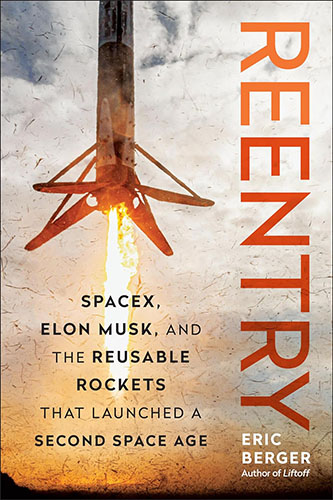Category: Non-Fiction
Reviewed by: Jeff Foust
Courtesy of The Space Review
Title: Rocketeers: How a Visionary Band of Business Leaders, Engineers, and Pilots Is Boldly Privatizing Space
Author: Michael Belfiore
NSS Amazon link for this book
Format: Hardcover
Pages: 304
Publisher: Collins
Date: July, 2007
Retail Price: $26.95
ISBN: 0061149020
Once you immerse yourself into a topic, it’s sometimes difficult to step back and take a look at the broader picture, particularly from the perspective of a layman. Spend any amount of time studying the entrepreneurial space industry and you’ll quickly be caught up in debates on topics ranging from technical details (horizontal versus vertical takeoff, liquid versus hybrid propellants, etc.) to policy and regulatory matters (the challenges of getting an FAA permit or license, the role NASA and other government agencies should play to incentivize the industry, etc.) Focusing on these details, you risk losing sight of what attracted these individuals and businesses to this field in the first place. That’s where Rocketeers steps in: it serves as an introduction to the general public, and a reminder to those who are already in or follow the field, of why people will risk fortunes and even their lives in an effort to open space to a wider audience.
Author Michael Belfiore spent the last several years following the entrepreneurial “NewSpace” industry, crisscrossing the continent to meet with people and companies at the vanguard of this emerging field. (Full disclosure: I’ve known the author for much of this time and I am cited in the acknowledgments section of the book.) He starts with perhaps the high point of NewSpace to date—the final SpaceShipOne flight that won the $10-million Ansari X Prize—but quickly moves from there to profile many other companies developing suborbital space tourism vehicles, low-cost orbital launchers, and inflatable habitats in space. Belfiore provides some behind-the-scenes tours of companies like Bigelow Aerospace (he was one of the first journalists to tour the secretive company’s facilities), SpaceX, and Rocketplane. At times he becomes a part of the story itself: forced to rent a minivan at the Toronto airport on a trip to see Brian Feeney of the da Vinci Project, he ends up using it to take Feeney to a Home Depot on a supply run, and later gets to help build one small component of the suborbital vehicle Feeney was developing at the time.
Belfiore bounces around not just the country, but the various companies as well. The book at times reads like a collection of standalone essays about specific companies and personalities rather than a single, monolithic book. He does try to tie it all together with a final chapter that offers a speculative look at what the Mojave spaceport might be like nearly 30 years from now if the companies profiles in the book are successful. (He also includes an epilogue that updates readers on the progress the companies in the book have—or have not—made as of early this year.)
While Belfiore does review, at a basic level, the technologies and markets these companies are going after, perhaps the biggest strengths of the book are the profiles of the key people in the industry, including Robert Bigelow, Peter Diamandis, Elon Musk, and Burt Rutan, among others. These profiles turn these people from simply names in a narrative about the industry into fleshed-out personalities with their own interests and rationales for working in this business. These character sketches help explain why these people are so motivated to work in this industry, despite the risks and expense: for many, it’s an opportunity to realize long-held dreams of spaceflight, often created by the exploits of the early Space Age, that previous, government-led efforts have failed to accomplish.
If you’re looking for detailed technical discussions about the vehicles NewSpace companies are developing, Rocketeers is not the right book for you. Indeed, nitpickers will find a number of minor typos and errors in the book, including one where Belfiore writes that NASA has “committed $500 billion” to the COTS program; the actual figure, of course, is three orders of magnitude smaller, $500 million. However, the purpose of the book is not to geek out on obscure technical design decisions. Rather, Rocketeers is for those readers interested in an overview of this nascent industry and its leading personalities, whether they are new to the topic or simply taking a step back from their own niche to get the big picture.
© 2007 Jeff Foust
Jeff Foust is the editor and publisher of The Space Review.
Please use the NSS Amazon Link for all your book and other purchases. It helps NSS and does not cost you a cent! Bookmark this link for ALL your Amazon shopping!




















